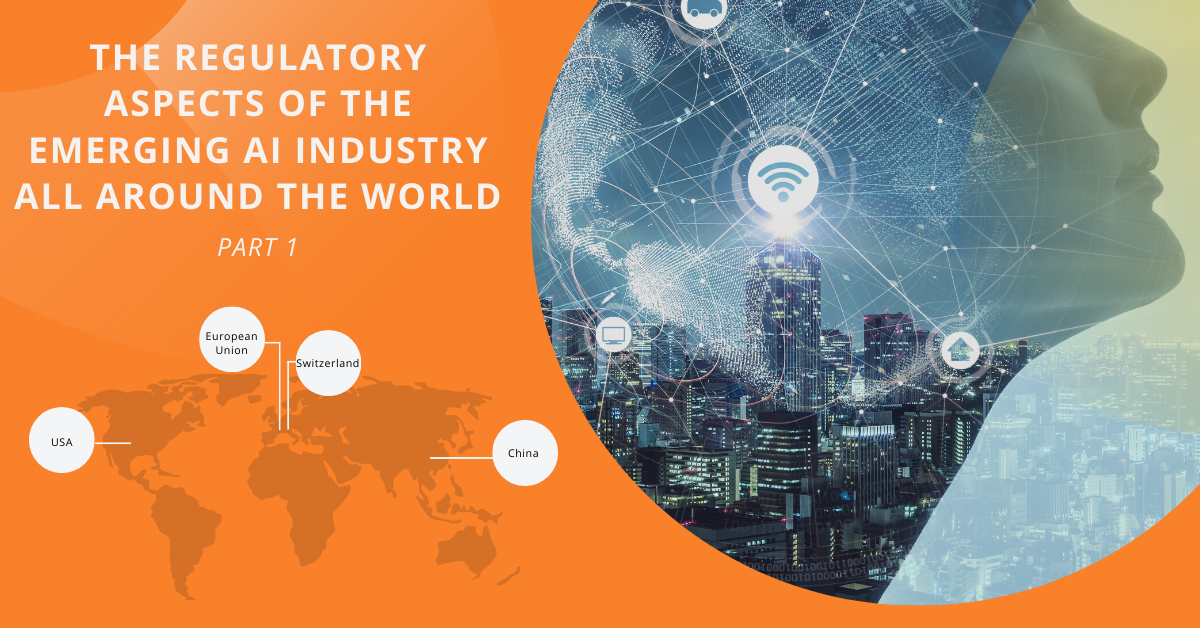
With a 54% year-on-year growth compared with 2019, and Artificial intelligence software market revenues going from 22.59 billion US dollars in 2020 to a forecasted 126 billion US dollars by 2025, we can safely say that the era of Artificial Intelligence has just begun. The AI’s potential is so gigantic that it is predicted to make up 26.1% of China’s GDP by 2030, and revolutionize almost every possible industry in existence. Nevertheless, great potential translates to enormous responsibility, which is why numerous countries, and global activists alike, emphasize the importance of regulating AI on both national and worldwide levels. Since the use of AI evokes certain moral dilemmas, legal disputes, and concerns regarding data privacy, what are the most important regulatory aspects of the emerging AI industry around the world?
Let us explore the state of AI regulations in the USA, European Union, Switzerland, and China to carefully analyze the juridical architecture of tomorrow’s AI-powered world.
1. Switzerland
With the highest number of AI companies per capita in Europe, Switzerland is one of the unquestionable leaders on the global AI scene, and so far it has earned the reputation of an innovation-friendly hub, where new technologies thrive without restrictions. Specific regulations regarding AI in Switzerland are yet to be announced but given that the Swiss government invested in research programs related to AI, and introduced special tax incentives for innovation, it is clear that Switzerland’s approach is a compromise between American eagerness to innovate and EU’s determination to ensure data security.
Switzerland is also home to numerous non-governmental initiatives, like SwissCognitive, which aims to create a strong AI ecosystem in Switzerland and unite all parties involved in the development of the Swiss AI scene, from businessmen to researchers and political figures.
2. China
As one of the world’s leaders in AI, China’s focus on AI centers around the notion of sustainable innovation, which would allow industries to gradually switch into AI-powered modes. The country introduced a series of AI-friendly regulations to promote innovation and their efforts result in the incredible growth of the tech industry. In fact, China is a prominent center of AI research, producing greater numbers of AI-related papers than any other country. The buzzing activity in the region translates to an enormous number of filed AI patents, and the Chinese government itself voices its support for the technology, publishing documents such as “Next Generation Artificial Intelligence Development Plan” or “Made in China 2025”, which aims to turn China into the hub of innovation, and high-end products.
3. European Union
Unlike the USA, the EU’s approach to AI centers around the notion of legal clarity and data protection, trying to encourage innovation, while ensuring compliance with the General Data Protection Regulation (GDPR) to build general trust in AI among the EU population. In “White Paper on Artificial Intelligence – A European approach to excellence and trust” published in February 2020, The Commission discusses AI-related risks concerning data privacy and security and advises adopting a moderate approach, which would protect citizens’ rights without slowing down technological innovation.
According to EU guidelines, the use of AI must never violate any safety laws and the mechanism of AI systems must be easily understandable to its users to ensure full transparency. A horizontal regulatory proposal is still in the works and expected for publication in 2021.
4. The USA
As the AI market in the USA is dynamically growing year by year, in November 2020 the US government issued an official “Guidance for Regulation of Artificial Intelligence Applications”, which orders federal agencies to “avoid regulatory or non-regulatory actions that needlessly hamper AI innovation and growth. Although the document mentions potential risks related to the mass implementation of AI, it urges not to “take a precautionary approach that holds AI systems to an impossibly high standard such that society cannot enjoy their benefits and that could undermine America's position as the global leader in AI innovation”. Consequently, we can say that AI has given a green light in the USA in order to maximize the country’s competitiveness.
However, it does not mean that the industry will completely avoid regulation, but that the government will only step in the cases when it is necessary to “address specific and identifiable risks”. Additionally, the Federal Communications Commission (FCC) and the Federal Trade Commission (FTC) are expected to develop agency plans, which will implement previously mentioned guidelines, and then publicly post them on May 17, 2021.
With the rapid development of AI technologies, 2021 is certainly shaping up to be the year of AI-powered innovation, and therefore we can expect jurisdictions from all around the world to publish their own AI guidelines within the upcoming months. Some countries will probably adopt the approach of the USA and China, likely leaving the industry largely unregulated to promote innovation, others like the EU might try to seek a compromise between technological growth and data privacy, and industry leaders, like Switzerland, are likely to combine both of these approaches to stay at the top of the AI industry chain. One way or another, the future of AI is beyond promising, and we are certainly entering a new era of tech-powered innovation.
Sources:
- https://a-teaminsight.com/ai-and-its-impact-on-the-future-of-regulatory-compliance/?brand=ati
- https://digital-strategy.ec.europa.eu/en/policies/european-approach-artificial-intelligence
- https://www.lexology.com/library/detail.aspx?g=4c845762-e954-4f47-8809-f5ad0f5d3716
- https://towardsdatascience.com/ai-regulation-no-longer-a-distant-future-4dc5600c082b
- https://www.wiley.law/newsletter-Dec-2020-PIF-Top-4-Areas-to-Watch-in-2021-in-AI-Legal-and-Regulatory-Risks
- https://ec.europa.eu/jrc/communities/sites/jrccties/files/reportontheeuropeanailandscapeworkshop.pdf
- https://www.nkf.ch/app/uploads/2020/06/GLI-AIML20_Switzerland.pdf
- https://www.globallegalinsights.com/practice-areas/ai-machine-learning-and-big-data-laws-and-regulations/china
- https://www.managingip.com/article/b1qsl1ghs6s37w/future-of-ip-china-a-closer-look-at-governmental-and-regulatory-support-of-ai
- https://hbr.org/2021/02/is-china-emerging-as-the-global-leader-in-ai





